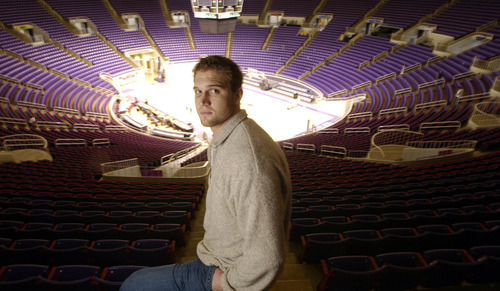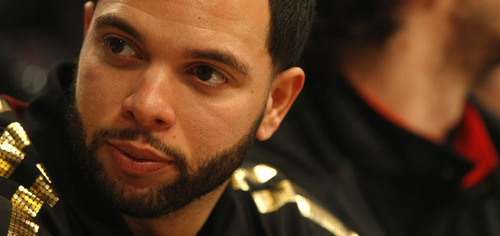This is an archived article that was published on sltrib.com in 2011, and information in the article may be outdated. It is provided only for personal research purposes and may not be reprinted.
Lance Allred has a piece of advice for Deron Williams and other NBA players who think they're going to weather the lockout by signing with and playing for teams overseas:
Watch out.
Since college, Allred, who played at East High School, the University of Utah and Weber State, has made a living for himself playing basketball on every continent except Antarctica. He's played in France, Turkey, Spain, Italy, Greece, Ukraine, Croatia, Serbia, Puerto Rico, Venezuela, Australia, New Zealand, China, Morocco and in Cleveland for the Cavs.
When he heard that Williams was headed for Turkey and that he was going to get paid $200,000 a month, Allred's reaction was …
"I saw that number, and I laughed," he said. "Deron could be above the fray with that sort of high-profile signing. That team might not want to have the reputation of not paying him, but that increases the chances that the other players will leave. If Deron gets his money, a lot of other people on that team aren't going to get theirs."
Allred said he's taken a poll of his peers playing overseas for the past two years: "They're averaging about half of what they were guaranteed to make. … The finances are going to be risky. Always."
A few years ago, Allred signed a deal to play in Italy for $160,000. "I didn't receive a dime of it, even though it was FIBA-guaranteed. The team folded two months later. It's such a crapshoot."
Beyond the finances are the playing conditions.
"NBA players are so used to a posh lifestyle — four-star hotels, traveling accommodations, unlimited towels, Gatorade and everything. You're so used to the comforts of a nice shower, and masseuses. Every European locker room I've ever been in doesn't even live up to my college locker rooms. There's grease-stained floors, cockroaches, showerheads that don't work. Those [fine] kinds of accommodations are gone.
"Plus, the travel, you're usually getting on a bus, you don't have your own private jet, usually. The little things that we tend to forget as NBA players, those are gone in Europe. I've known a lot of NBA players who go over and after about a month, they say, 'I can't do this anymore.' Even if they're getting paid, it's just the living conditions, the apartments they put you in. … You have a lot of NBA players who go over, and they think it's going to be great and they just kind of disappear. It doesn't match the lifestyle they want and have in the NBA.
"That's a surprise a lot of NBA players are going to be in for."
Maybe those are the kinds of surprises that would give NBA players perspective they now lack. I say all NBA players should go play overseas just to realize how great they have it here. Then the labor negotiations would go quicker, smoother. Every NBA player should read Allred's just-released book: Basketball Gods, which chronicles, among other things, some of his journeys through a tougher professional life.
One of the surprises Allred encountered came when he played in Turkey, where a team refused to wire his money to him because of what Allred said the team called "tax issues." Instead, a club executive handed him $20,000, straight green, in the middle of a crowded mall, with people all around him.
"Everyone stopped and looked at it," he said.
Allred ducked into a less-crowded place with his brother, who was visiting him, handed him the cash, and then the two of them split in different directions, Allred breaking into a full sprint down the mall as "two shady guys" chased him.
As for the game on the court, Allred said that, too, is a different world. Players, many of whom don't have guaranteed contracts, want to get their numbers so they can enhance their chances for better pay. He said those circumstances, along with the way the game is coached, could drive a player such as Williams crazy.
"Deron likes to run the show, he doesn't really listen to coaches much. But if you thought Jerry Sloan was tough, these European coaches are lockdown. When I was in the Ukraine, we practiced twice a day, five days a week. People say, 'Oh, you only play one game a week, you can relax and rest your body.' Not the case. … It's ultracompetitive with the team, plus the coach wants to control everything."
Allred said the norm overseas is for the team to script out daily routines of the players: "You have no control over your personal life. In the NBA, you show up, do your job and do whatever you want. In Europe, you have an itinerary, you eat as a team every meal, you have to be places at a certain time."
It's reasonable to assume that even a tough coach would bend a bit for a star NBA player such as Williams, but Allred said there are sharp knives all around if those exceptions are made.
"Is a coach going to give Deron a double standard? In Europe, if you do that, there's going to be a mutiny with the other guys."
New Jersey, D-Will, under any new collective-bargaining agreement, sounds better and better all the time.
GORDON MONSON hosts "The Gordon Monson Show" weekdays from 2-6 p.m. on 97.5 FM/1280 AM The Zone. He's at gmonson@sltrib.com.





